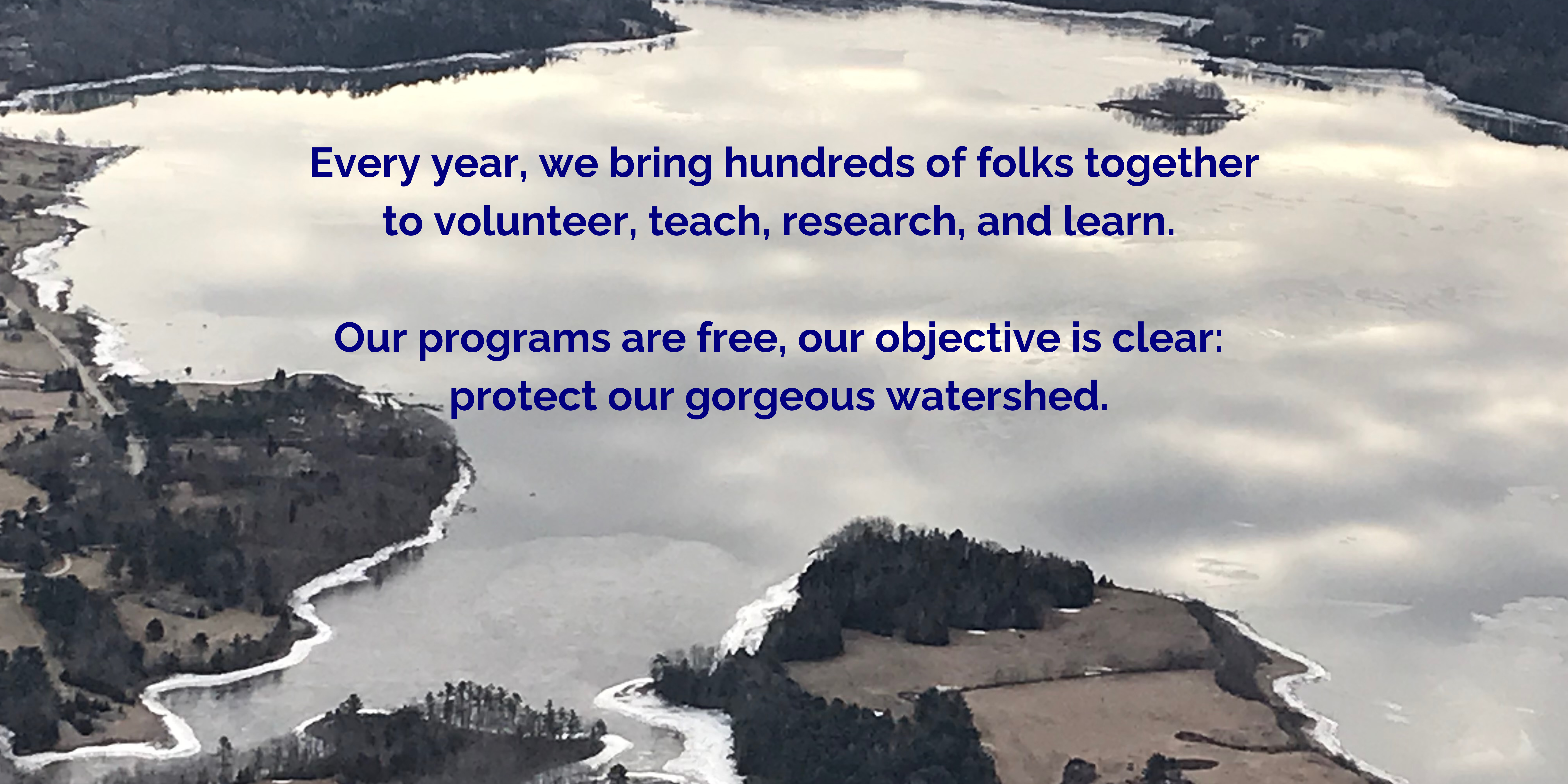BBWC NEWS
Natural Literacy
2020 Annual Report
Summary of 2019-2020 Programs, Outings and Birding
The BBWC Quality Monitoring Program Needs an Organizer
The Belfast Bay Watershed Coalition has been monitoring water quality in Belfast Bay for several years and the current volunteer organizer is retiring. BBWC is actively looking for someone to continue this important work. The water quality organizer coordinates the work of a team of water quality monitors, schedules test equipment usage, and passes the water quality data to John Tipping, a BBWC board member, who then reports the data to the DEP.
To learn more about the job, please contact Leo Shea lsshea@gmail.com
To learn about other volunteer opportunities, please contact Pat Gladding patricia.gladding@gmail.com
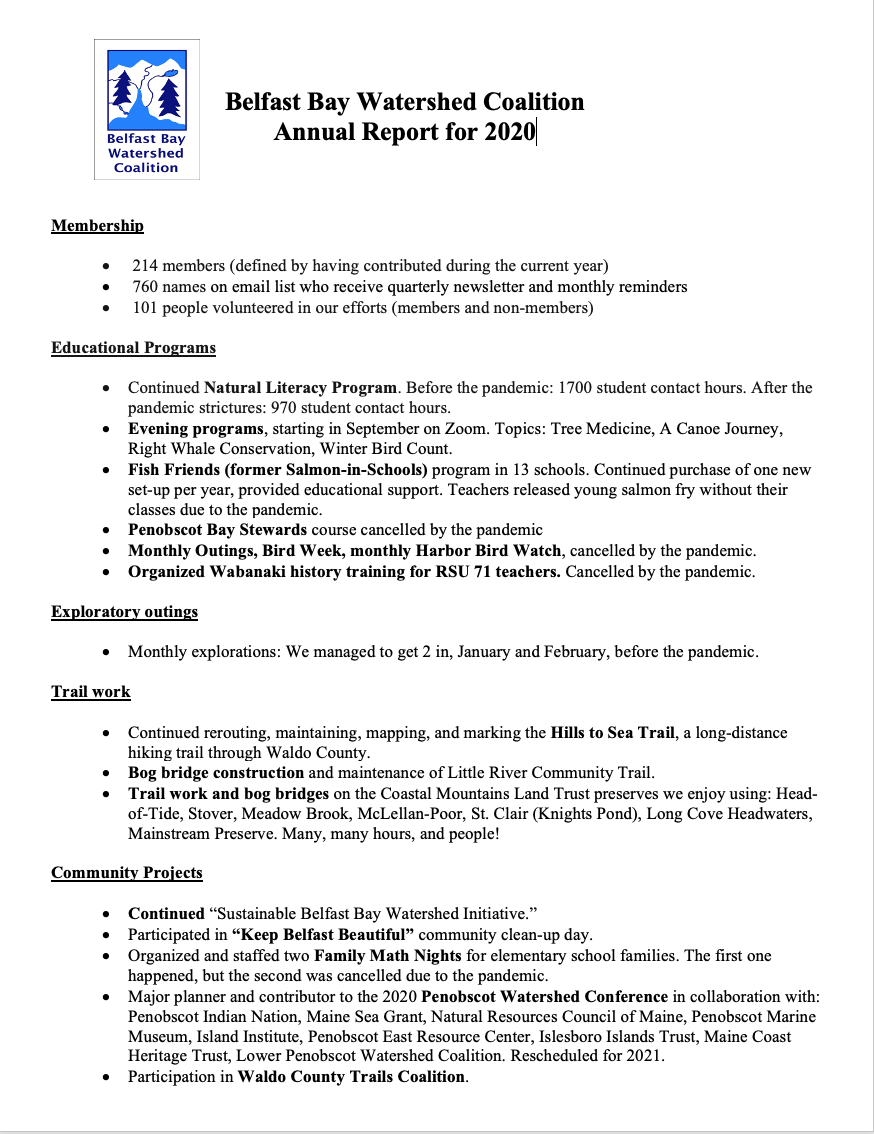
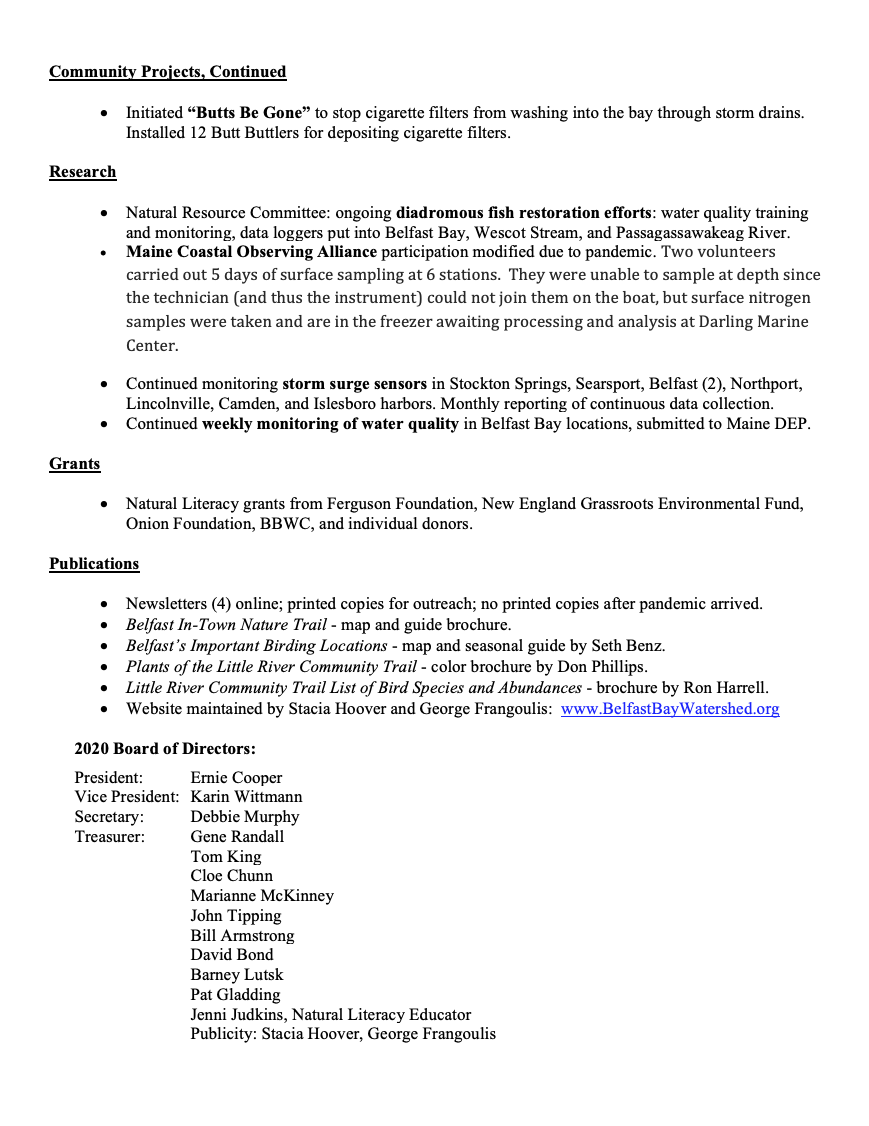
Belfast Bay Watershed Coalition Installs Butt Butlers - May 2020
Volunteers from the Belfast Bay Watershed Coalition installed 12 Butt Butlers – containers for discarded cigarette butts-- along Main and High Streets in downtown Belfast. Cigarette filters contain chemicals like arsenic, lead, and plastics. Left on the streets here in Belfast, they are washed down the streets and drained directly into the bay. Making use of the Butt Butlers will protect our bay and the life in it. This project was the undertaken by Kevin and Susan Connolly, and Debbie and Tom Murphy.
Funds for the project were provided by BBWC, Coburns Shoes, The Eco Store, Delvino’s and Front Street Pub. For further information, or to get involved, contact Kevin Connolly at connollykevin58@gmail.com
Water Research in Belfast Bay, its Watershed, and Beyond
Belfast, Fall 2019
The BBWC now engages in five different forms of research to understand the science and nature of Belfast Bay and its watershed. The bay is part of North Penobscot Bay, influenced by not only the 4 watersheds draining into Belfast Bay, but also the entire Penobscot River watershed coming into North Penobscot Bay. The Penobscot watershed comprises roughly 8,600 square miles, nearly 1/3 of Maine’s landscape, and is the largest watershed within the state boundaries. (The St. John watershed is larger, much of which is in New Brunswick.)
Meteorological records show that Maine’s precipitation has increased considerably in the recent two decades, changing water chemistry in the Gulf of Maine. Climate change is also affecting river and gulf temperatures, sea level rise, and harsher storm wave action. BBWC is engaged in initiatives to assess and understand all these changes, as well as establish a record baseline of current conditions.
In summer 2019, BBWC joined the Maine Coastal Observing Alliance (MCOA), extending its reach north from Rockland, where it previously ended, to include Belfast Bay. MCOA is a consortium of ten local citizen groups concerned with the health of their local estuaries, from Casco Bay now to Belfast Bay. By working together, their goal is to provide a regional perspective of estuarine water quality through the sharing of resources and expertise and the implementation of a coordinated water sampling program.
Measurements and water samples were taken at five locations (from the old bridge out to open waters off Bayside) on four days in August and September. The MCOA program provides a technician and instrument, enabling us to take multiple readings from the surface down to the bottom at each site. Data collected includes turbidity, temperature, salinity, dissolved oxygen, and pH; the surface water samples are later analyzed for nitrogen content. Once all the data has been processed and analyzed, MCOA provides a report to each partner organization on results from their local waters and how this compares to other estuaries in the state. https://mcoascience.org/
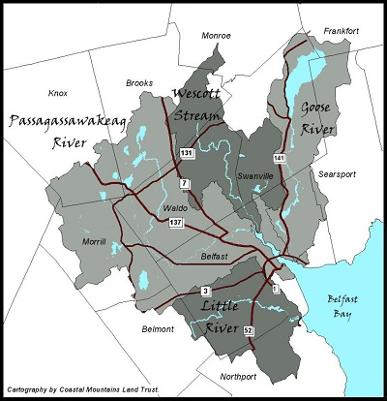
Belfast Bay Watershed
The second regional water sampling program in which we participated was "Shell Day." BBWC was one of 57 organizations participating to sample 100 sites ranging from New York to Maine. This one-day data collection blitz was organized by scientists seeking to determine acidification patterns in near-coastal waters, as opposed to further offshore. On August 22nd, citizen scientists from BBWC's ongoing monitoring program collected physical parameters and water samples at three stages of tide during the day. The samples were then delivered to UMaine Darling Marine Center labs, where they will be analyzed. A significant benefit of our collaboration in both of these programs has been the opportunity to network with researchers and environmental organizations from other parts of the coast. http://www.necan.org/shellday
For two years, BBWC volunteers have monitored storm surge sensors monthly, year round, as part of a UMaine study of two bays, of which North Penobscot is one. The sensors continuously record water levels once every minute. Our monitors check sensors in Stockton, Searsport, Belfast (2), Northport, Lincolnville, Camden, and Islesboro harbors. With our data and others, UMaine is able to understand the physics and changes in storm surge heights.
Also for two years, BBWC volunteers have tested water quality in Belfast Bay, at the public wharf and at the mouth of the Little River, for temperature, dissolved oxygen, conductivity, pH, and salinity over time. Volunteers test the water each week, at both high tide and low tide. These data, which we report to the DEP, are establishing a baseline, which did not exist before.
BBWC pays for a professional water quality evaluation every three years in the Passagassawakeag River and Wescot Stream, in order to submit statistics to the DEP on local watersheds. Data from Wescot Stream comes from the site where students from 12 area schools release their salmon fry, which they have raised from eggs in the classroom in our Fish Friends program.
BBWC also leads outings each month in order for people to see and learn for themselves the nature of the Belfast Bay watershed and its inhabitants. As a conservation organization built on principles of research and education, BBWC does not enter the political realm. It is believed that if correct science is presented, citizens will draw conclusions and take action they see necessary. To espouse an argument would create suspicions of bias and therefore doubt. BBWC prefers to present the facts that can be ascertained, to give citizens correct information to work with.
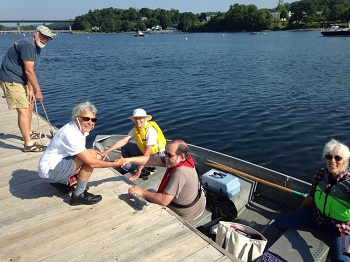
Water quality monitors take weekly readings in Belfast Bay.
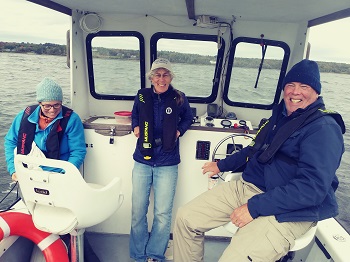
Celeste Mosher (MCOA Technician) and volunteers Sally Bennett and Jon Beal after a successful data collection trip in Jon's boat, the Range Ranger.
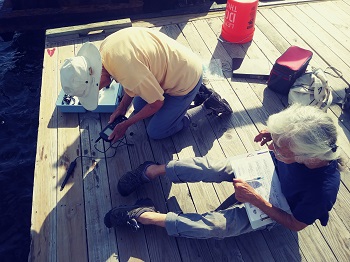
Shell Day monitors.
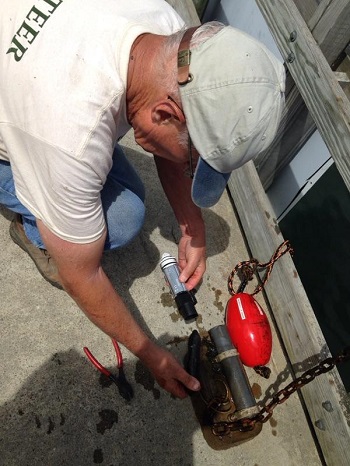
Storm surge monitor Dave Bond takes monthly data from a submerged sensor.
Middle School Students in State-wide Coastal Clean-up
Belfast, Fall 2019
“Look at this cash register drawer!” yells a 7th grader, picking up a large object on the beach in East Belfast. As others run over to put it in the trash bag, another student hollers, “Look at the water!” All eyes turn to see a bald eagle swoop down to attack a cormorant standing on a rock drying its wings. The cormorant dives into the water just in time, and the eagle flies away empty-taloned.
September 25 was Troy Howard Middle School’s day joining the Maine Coastal Clean-up Week. The entire 7th grade, 110 students, some teachers, parents, and 12 volunteers from the Belfast Bay Watershed Coalition, scoured the Belfast shoreline from the Little River on the Northport line, eastward almost to the Searsport line.
While 9 teams worked the shoreline, 4 additional smaller teams glued storm drain markers on nearly 100 storm drains in town, to educate people that storm drains connect directly to the bay. It is harmful for anything but rainwater to drain down a storm drain. Cigarette filters, soap from car washing, pesticides and herbicides are among the toxics that find their way into the bay.
Bag lunches and nature observations filled out the day’s activities before the students returned to school on buses, carrying their trash bags with them for inventory of types and source of debris, weight, and counts. These figures will be turned into the state analysis of Coastal Clean-up week, as well as providing students with math practice using weights, measures, percentages, and probability statistics.
Some of the nature observations included a lobster trap containing a mammal skull, several monarch butterflies, diversity of rock types and shapes brought from northwesterly sources by the glacier, a healthy drape of rockweed protecting marine species in its tendrils. One team collected 44 leaves to take back and learn about.
Students expressed pride in helping their community and their place, and many started thinking about other service projects for the environment.
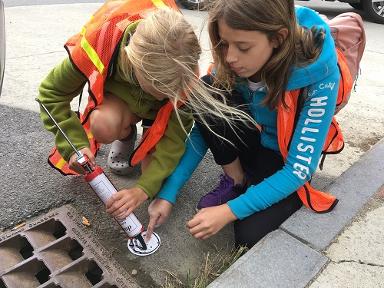
Students apply storm drain markers.
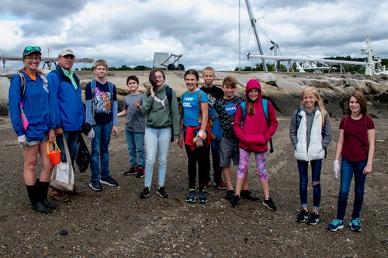
A shoreline team having fun while cleaning up the beach.
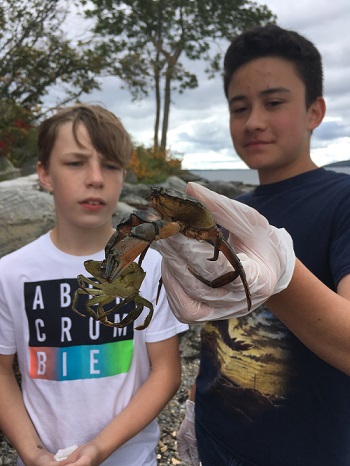
Look! A crab eating a crab!
Photos by Gene Randall
First Honor Tree at City Park
Friday, October 25, 2019 at 11 am (Wed. cancelled due to rain)
City Park, Belfast
The Belfast Bay Watershed Coalition is planting the seed for a new tradition at City Park - to add to the Arboretum collection and to replace dead and dying trees. We invite anyone who is interested to join us in a brief ceremony. Parking closest to the ceremony is at the swimming pool. For more information, call 338-1137.
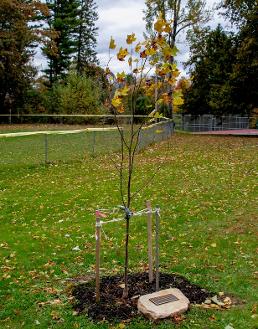
Water Quality Monitors for Belfast Bay - July 2019
Several Penobscot Bay Stewards from the BBWC, trained by John Tipping, a BBWC board member, have begun monitoring various points in Belfast Bay. Tipping is director of Lotic, Inc., in Belfast, a professional lab that tests effluent from sewage treatment plants around New England, and other water-related projects such as eel grass mapping and stream quality studies. Tipping has trained Stewards to sample the bay at a high and a low tide, 6 hours apart, of the same day. This is done weekly at the town dock, the mouth of the Little River, and other planned places to be added.
Organizing the volunteers and keeping track of trainings and findings is Leo Shea, a Penobscot Bay Steward in his second year of monitoring.
The object is to establish a baseline understanding of water quality in the bay based on values of dissolved oxygen, conductivity, pH, temperature, and salinity over time. If the proposed salmon farm in Belfast is permitted by both the BEP and Maine DEP, BBWC will also be watching their data on public record.
Stewards participating in monitoring are committed to weekly readings using a professional test kit with 4 different probes and a handheld digital reporting screen. Thanks go to John Tipping for sharing his equipment, which we otherwise would not be able to afford, to Leo Shea for leading the Water Quality Team, and team members Sharon Besso, Joe Duggan, Paul DeOrsay, Sally Bennett, Barbara Bell, Susan Connolly, Susan Dexter, Caryn Converse, Martha Stamp, Paul Eagle, and Rick Fitzsimmons.
Monitors do not have to be Penobscot Bay Stewards. Anyone interested in helping with this effort by being a weekly or a substitute monitor should contact the BBWC at info@belfastbaywatershed.org
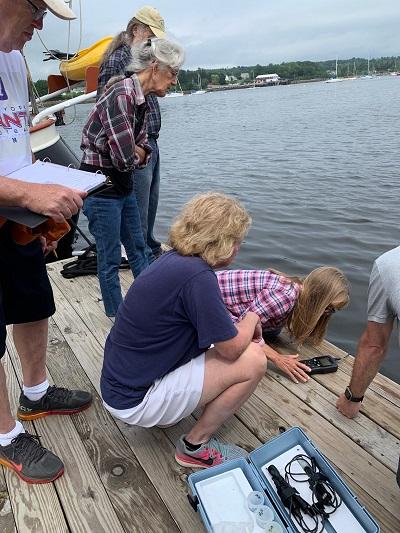
Water quality monitors at work. Photo by Leo Shea
Arbor Day in Belfast - May 2019
National Arbor Day is in April, but in Maine that timing isn't always good for planting. We celebrate the third week in May. Two members of the Belfast Bay Watershed Coalition (BBWC), Tom King and Marianne McKinney Randall, brought Arbor Day to some local schools on Tuesday, May 21 by visiting East Belfast School, Capt. Albert Stevens, Ames, Drinkwater, and Cornerspring Montessori.
Following a discussion about the importance of trees and how to plant a tree, every third grade student received a native White Spruce seedling to take home and plant. The happy faces and enthusiasm showed the children enjoyed learning about Maine and our native trees. Some adults reminisced about planting seedlings on Arbor Day as children, and then the joy of watching them grow up and seeing them years later.
BBWC would to thank the Maine Forest Service for the donation of 135 seedlings to make this happen.
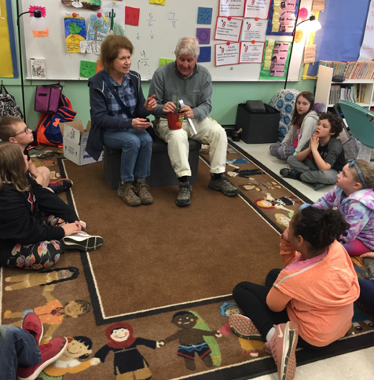
BBWC members Marianne Randall and Tom King distribute white spruce seedlings to third graders in 5 area schools. Photo by Sue Beemer.
Salmon Fry are Free to Swim - May 2019
Tom King of the Belfast Bay Watershed Coalition, along with volunteers David Greeley and Bill Smith, helped twelve local schools raise and release their Atlantic Salmon fry in Wescot Stream this May. Students raised the salmon from 200 eggs per school. The three month process takes place in classrooms around the state as part of the Atlantic Salmon Federation’s “Fish Friends” program.
Not all eggs become fry; loss is inevitable, just as would happen in nature. So the students are required to do record keeping and report to Dept. of Marine Resources their release number. Wescot Stream is an excellent site for the release because of great water quality, good salmon habitat, and it is the only undammed tributary of the Passagassawakeag River.
The Belfast Bay Watershed Coalition has been facilitating Fish Friends locally for nearly a decade.
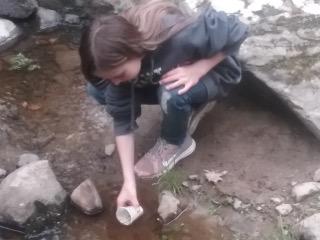
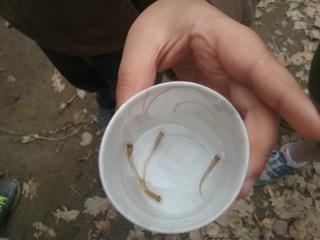
Family Math Night Combines, Pizza, Puzzles, Parents, and Pupils
On February 27, 2019 Captain Albert Stevens School (CASS) in Belfast hosted a Family Math Night for students and parents of RSU #71 elementary schools. The lunchroom and the library were filled and buzzing with dozens of students and their parents. Math learning activities included shopping for groceries; laying out a house foundation; playing Mancala; tossing bean bags and keeping score; cards, dice, and board games; counting games for the youngest; telling time and temperature; math stories which gently taught fractions, decimals, and other functions; brain teasers with numbers; statistics taught with ball tossing and spinners; beehive geometry; Tangram puzzles, and more.
The evening began with a pizza supper provided by the CASS Parent-Teacher Group, and was attended by 39 students and 30 parents. The evening ended with a parent gathering to evaluate the process while students attended a Math Magic Show. At the end, a parent remarked, “I dragged my child to this, and was pleasantly surprised to see he got totally engaged in the games.” Others said they planned to continue playing math games at home.
The game stations were run by 19 volunteers from the Belfast Bay Watershed Coalition, Penobscot Bay Stewards, and Waldo County Literacy Volunteers.
“I was completely impressed with the volunteers, their enthusiasm and the depth of the questions they were asking. It was as if they had been working with kids their whole lives. (Which, I guess was true for some of them; I found there were some retired teachers helping out.) Their excitement was contagious, drawing the students in and making for an evening that was the perfect combination of learning and fun.” ~Principal Glen Widmer
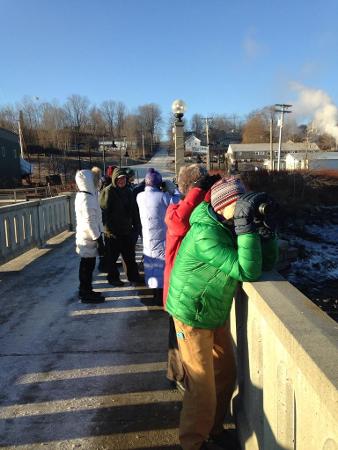
Monthly Birding from the Footbridge
by Ron Harrell
Feb. 12, 2019 -Gary Gulezian and I were joined by at least 10-12 people, not counting casual passersby who only stopped to take a quick look in our scopes.
We saw 12 species, totaling 237 individual birds. The highlights were 2 peregrine falcons perched on the water pipe on the Rt. 1 bridge, an Iceland gull, and a lesser black-backed gull. Despite the frigid temperatures and wind, the people turnout was great and we saw some nice birds. There is now a group of regulars that turn out each month, and we all have a good time. Gary and I suspect that at least one of the peregrines is a winter resident this year.
There are two more opportunities this winter: March 12 and April 9, from 8:00-10:00. We’ll start up again in September.
Check Outings for birding opportunities with the BBWC!
Coalition Thanks 180 Volunteers
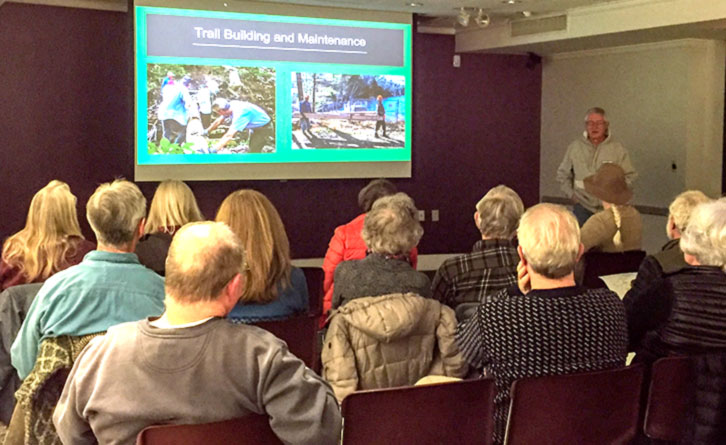
On January 17, 2019, during the Annual Belfast Bay Watershed Coalition Meeting and Program, the Board of Directors gave a shout-out to over 180 volunteers, who helped with various initiatives during 2018.
A group of enthusiastic members and volunteers socialized, over refreshments, to renew old friendships and meet new people before the program began. As with all BBWC programs, the general public was also invited.
President Ernie Cooper welcomed the group and introduced a slide presentation that highlighted 2018 BBWC activities. Volunteers provided support to programs such as: the Penobscot Bay Stewards (2019 applications open on Feb. 1st); the Pen Bay Stewards Alumni Association; Fish Friends (the salmon egg rearing program in 12 local schools); the monthly Harbor Bird Watch Program; the Natural Literacy Education Program in local schools; Storm Surge Sensing in 7 mid-coast harbors, Water Quality monitoring in Belfast Bay, building and maintaining local trails (including the replacement of old bog bridges on the Little River Community Trail); and numerous other programs, outings, and workshops.
In addition to individual efforts, two groups of volunteers deserving recognition were the team from Maine Coastal Regional Reentry Center and high school students from The Waldo County Technical Center.
The BBWC Board of Directors expressed gratitude to the many people who work for watershed conservation through research, community-building, and education, the 3-pronged mission of the coalition.
Winter Birds of the Belfast Bay Watershed
On December 29, the 2018 Christmas Bird Count for the Belfast sector, sponsored by the Belfast Bay Watershed Coalition, was conducted by 29 volunteers. They divided up the territory, a 15-mile diameter circle from the Belfast Bay to Stockton, Frankfort , Monroe, and Waldo. The center of the circle is Mt. Waldo. Watchers combed their sections all day tallying birds by species. For once, the weather was mild and partly sunny, and participants didn’t feel threatened to be out all day.
Results added up to 61 species seen, totaling 4962 individual birds, 1189 of which were herring gulls.
A detailed list is available here.
Some less common sightings on land included a northern shrike, northern mockingbird, Carolina wren, 2 northern flickers, 2 Coopers hawks, and 23 evening grosbeaks. On the bay, a peregrine falcon, a kingfisher, 2 wood ducks, 2 great black-backed gulls, 2 black guillemots, 5 razorbills, and 6 red-throated loons. Partridges were seen, but not in a pear tree!
The Christmas Bird Count began in 1900 aiming to reverse the trend of going out on Christmas Day and shooting birds. It indeed caught on, never missing a year of the 20th century and still continuing, now happening all over the world. Maine has 29 count circles with individual counts scheduled on different days, between Dec. 14 and Jan. 5, to allow participation in more than one count.
To join the team, contact Seth Benz at sbenz@SchoodicInstitute.org .
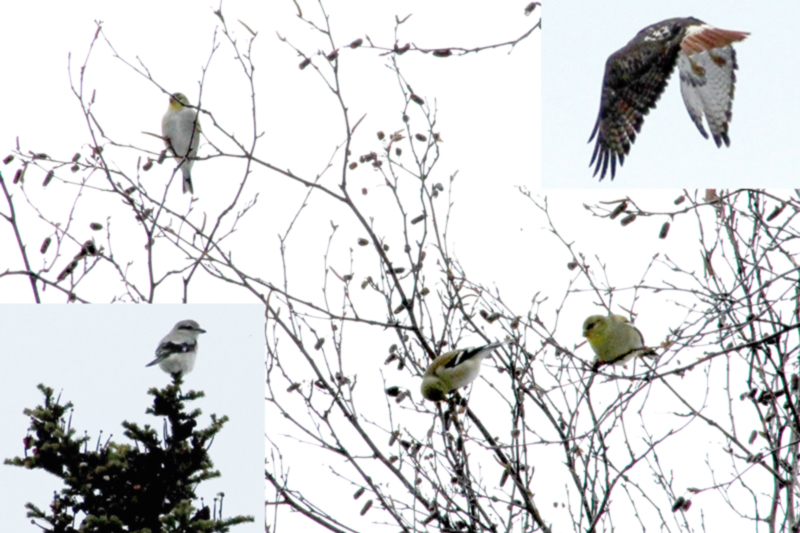
New Bog Bridges for Belfast’s Little River Community Trail
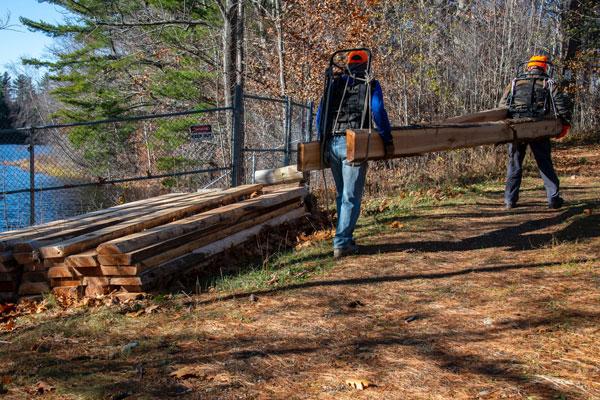
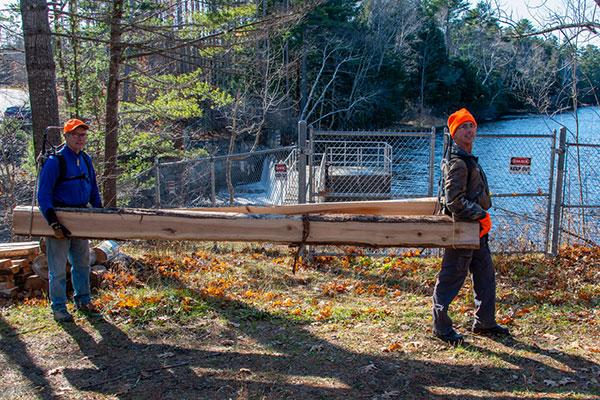
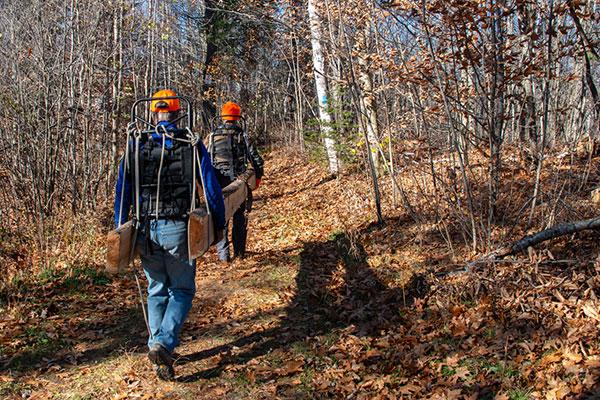
Bill Armstrong (on the left) and Tom Murphy moving 12 ft. cedar planks into the upper portion of the Little River Trail (photos by Gene Randall).
A grant from the Maine Community Foundation has enabled the Belfast Bay Watershed Coalition (BBWC) to purchase enough cedar planks to replace most of the 180 aging and breaking bog bridges along the 5-mile trail through Belfast.
A team of volunteers from the Waldo County Reentry Center has been busy helping BBWC’s Trail Crew carry the planks into place all along the trail, which runs from the Belfast Water District on Rt. 1 to the University of Maine Hutchinson Center.
Started at the turn of the current century, the first mile went from the Water District to the Perkins Road. In 2005, a Project Canopy grant from the Maine Forest Service allowed BBWC to extend the trail to the Walsh Ball Fields on Rt. 52. Students from Troy Howard Middle School helped with the project. The final stretch to the Hutchinson Center was built with BBWC funds. The trail has been continuously maintained by the Belfast Bay Watershed Trail Crew, founded by Skip Pendleton and currently headed up by David Bond and Bill Armstrong.
Our community enjoys the trail due to the generosity of private landowners, the City of Belfast, Waldo County, and the Belfast Water District. The new bridges will continue its enjoyment.
Storm Surge Sensing
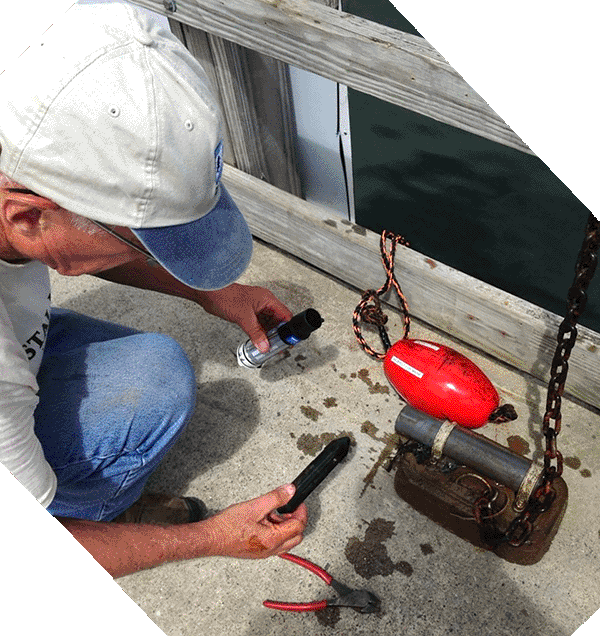
BBWC volunteer Dave Bond collects data from a storm surge sensor in Belfast Harbor.
On July 19, 2018, University of Maine researchers presented their first-year findings about mid-coast storm surge magnitudes to a local audience at the Hutchinson Center in Belfast. This is a public awareness initiative along with a data collection process, collecting pressure readings every second, ongoing. Volunteers download data each month from the sensors placed along the coast. They email the data to the UMaine researchers: Dr. Kim Huguenard, Dr. Laura Rickard and graduate students. Belfast Bay Watershed Coalition volunteers Dave Bond and John Tipping have monitored in 2017-18. They will continue, adding other volunteers to expand the data points.
The program focused on the two “bomb cyclone” events of October 30 and January 4. A bomb cyclone event is defined by a drop of 24 millibars of barometric pressure in 24 hours or less.
Normal high tide + storm surge increment = storm tide height of the event.
According to the researchers, the October 30 event left more CMP customers without power than the Ice Storm of ’98. The January 4 event caused the third highest tide on record in Portland, in spite of occurring at mid-tide ebbing, with a north wind countering the surge. Other coastal communities remember it as well.
Data were collected in 3 estuaries: the Penobscot River, Bagaduce River, and Bass Harbor/Southwest Harbor, chosen for their diversity of configuration. Much valuable information has been gleaned so far, to help coastal town planners and emergency preparedness services. Visit the project's website to learn more SensingStormSurge.acg.maine.edu .
To volunteer for the ongoing project, please email info@belfastbaywatershed.org . Besides monitoring (data collection), there are other volunteer opportunities, including hosting local presentations in coastal communities.
Belfast Co-op Donation to BBWC
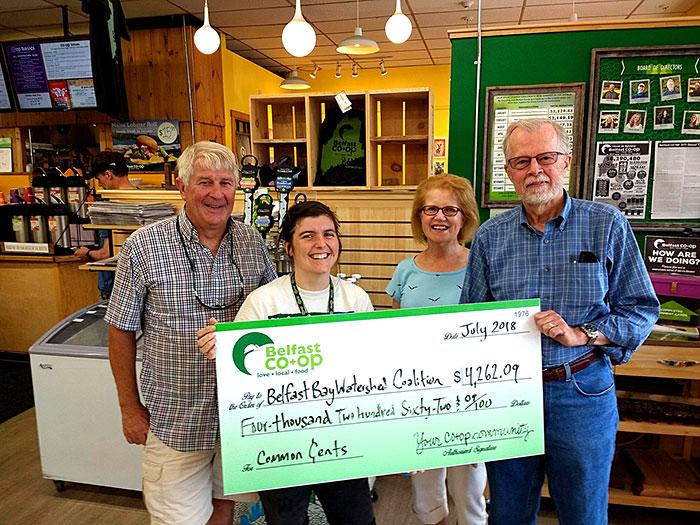
BBWC gratefully accepted our community’s donations, through the Co-op’s Round Up Program (Common Cents), for the month of July 2018 totalling over $4,200. These contributions will enable the BBWC to continue their work to support conservation and stewardship of the Belfast Bay watershed through outings, programs, research, and education. Accepting the gift from Annie Bussiere (2nd from left) areTom King and Marianne & Gene Randall
BBWC Receives an MCF Grant for Little River Trail Bridge Restorations
The Belfast Bay Water Coalition (BBWC) has received a grant from the Maine Community Foundation to repair aging bog bridges on the Little River Community Trail.
Time and weather have taken their toll on many of the bog bridges that were built out of hemlock 10-15 years ago. These bog bridges will be replaced with cedar planks and are expected to last much longer.
A $5,300 Maine Community Foundation Grant will be a big help to pay for the wood and hardware that is needed for repairs to about 90 bog bridges. The BBWC trail crew will provide the tools and labor for the repairs and hope to have many of the bog bridges repaired or replaced by the end of the year.
This repair effort will make the Little River Community trails safer and more accessible, leading to more outdoor actives for all, for a long time.
Nordic Aquafarms
Dear Members,
The City of Belfast has an opportunity for a new business, Nordic Aquafarms, which is causing concern to many citizens of Belfast and the surrounding communities. Many of the questions and concerns cannot be answered at this time. Rezoning of land is the first of many steps the City and Nordic Aquafarms have pursued. Once Nordic Aquafarms does more on-site investigation, additional information should be available regarding what they plan to do.
Several BBWC Board members have been asked by you, our membership, “Where does BBWC stand on Nordic Aquafarms building the largest indoor salmon farm in the world, in Belfast?” At our last BBWC board meeting this issue was addressed and the following conclusions were reached:
1) The BBWC board has no position at this time. We feel that too little is known now to make a statement.
2) We are a non-profit organization. We are looking into the legality of taking a position either for or against Nordic Aquafarms. Our mission statement is the following: “The Belfast Bay Watershed Coalition supports conservation and stewardship of natural and public resources of the Belfast Bay watershed through research, community-building, and education.”
As the process unfolds for Nordic Aquafarms to establish a water supply, obtain a discharge permit, and meet other DEP regulations, the BBWC board will continue to follow the course of events, and will keep the membership updated as to BBWC’s position in the future.
On another matter, please remember that summer is fast approaching and trail maintenance is needed— not only the Little River Trail, but also all the great properties that Coastal Mountains Land Trust (CMLT) is responsible for. CMLT is striving to raise $75,000 for the Jo & Skip Pendleton Stewardship Fund for a Waldo County stewardship intern. We anticipate this person will be working on trails throughout greater Belfast, not just on Land Trust land. I encourage folks donate to the Stewardship fund online.
Thank You for your continued support.
Tom King, President, BBWC
Skip Pendleton, Forever Young
The Belfast community and Waldo County lost a giant with Skip Pendleton’s passing on September 24. Skip was important to so many people and organizations, including the Belfast Bay Watershed Coalition.
After retirement, Skip and his wife Jo were among the founders of the Passy Coalition in the 1990s, which morphed into the Belfast Bay Watershed Coalition in 2004, with Skip as our first president. His strong leadership guided the development of our three arms: research, education, and community- building.
A tireless advocate for the natural world, Skip spoke out often at City Council and other community meetings, always with humility and respect, winning people to his philosophy of stewardship and caring. Skip was a bridge-builder in society as well as on the ground as he organized trail crews to establish paths, bridges where needed, throughout the mid-coast area. He was the driving force and perpetual steward of the Little River Community Trail, hundreds of miles of trails and bridges on Coastal Mountains Land Trust preserves, and in his last years, the Hills to Sea Trail, a 47-mile trail from Unity to Belfast.
Skip thought up and led public outings for years to show people the special places in and out of Waldo County, some places that no one else would have known about. He was eager to share these trails and paddles with everyone in hopes of spreading the joy of being outdoors in the “Real World” and the ethic of caring for its future.
The legacy Skip has left is all around us. However, what most endeared Skip to so many of us was his youthful energy for exploring nature, his gentle, peaceful spirit, his sense of what honestly matters in life, his deep appreciation of each individual he knew and of the many places he loved.
Cloe Chunn on Good Morning Belfast, July 17, 2018
